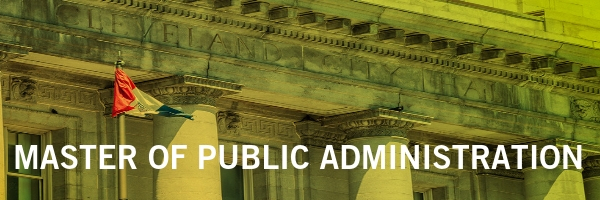UST 692 is a generalist public administration capstone seminar that provides a final common experience for MPA students. In this course, students integrate learning from the MPA core curriculum with professional practices encountered in public and nonprofit organizations. Students prepare and defend a capstone paper. The following is a list of capstone projects that have been prepared & presented by MPA students:
Fall 2019
- Bridging the gap: Public administration theories and the city management profession
- Farmers’ markets: Creating social capital, building trust and community while fostering civic engagement
- Grantmaking in Cuyahoga County: Commonalities among health and human service private grantmakers related to sustainability
- New innovations and social service agencies
- Public funding influence on nonprofit programming and mission fulfillment
- The impacts of beautification on urban environments
- What are the best practices adopted by foster care programs to increase the graduation rate among foster youth?
- What makes Vision Zero successful? Evaluating Vision Zero policy using the four Es of public administration
Spring 2019
- A critical analysis of youth homeless policies in the United States
- Adoption of the Good Food Purchasing Program at Cleveland Municipal School District
- Affordable on campus university housing
- A project evaluation of the Ohio Department of Public Health’s 2018 Hepatitis A outbreak response through a performance management system framework analysis
- Building inclusive boards for arts organizations
- Challenges to the legitimacy of the administrative state
- Closing the gap: Hiring practices in employing people with disabilities
- Commercial property revitalization
- Democratizing criminal justice: Project implementation plan for criminal defendant wayfinding app
- Efficacy and equity in public grantmaking
- Equity in local climate adaption planning
- Evaluating the Ohio benefits project: Goal achievement and satisfying the four Es
- How are cities including environmental justice when strategically planning for climate change adaptation and mitigation?
- Manager or mayor? Assessing the impacts of local government leadership on solid waste services
- Medical debt: A public crisis
- Millennials and public service
- Social media engagement for nonprofits
- The management values of public administration within special districts
- The public value in universal child care
- Use of predictive analytics in higher education: Implementation at Cleveland State University
- Waste management in local government
Fall 2018
- Adequacy of public school education funding in Ohio
- An evaluation of Cleveland Metropolitan School District’s transportation program through the four Es framework: Efficiency, effectiveness, economy, and equity
- Assessing local efforts to address social determinants of health
- Body-worn cameras in EMS: A regulatory process for policy-compliance management
- Evaluation of juvenile justice risk assessment tools using the four es of public administration
- Generational impact of codes of ethics in nonprofit organizations
- Place branding strategies to enhance Cleveland’s perception
- Police regionalization using the FOPA model
- Taxes “coming out of her wherever”: An examination of sales taxation on menstrual products in Ohio
Fall 2016
- Spillover Effects: Analysis to Determine if Economic Development & Land Use Propels Gentrification in Other Areas
- The Peculiar Family: Exposing ‘Blaming the Victim’ Policies
- Accessibility in Higher Education: Going Above and Beyond the Legal Minimum
- Grandparent Caregivers’ Limited Financial Resources
- Cleveland Voices: Technology in Modern Museums
- Ban the Box: Fair Chance Hiring Legislation and Unintended Consequences
- Nonprofit Hybrid Organizations and their Implications: What are they, how they interact, and at what cost?
- Mass Incarceration: Cuyahoga County Community Cares Initiative
- Public Participation & Electric Vehicle Policy: A review of public participation and its role in creating and implementing electric vehicle policy
- Municipal Home Rule and Breed Specific Legislation
- Public Service Education: Enhancing the Regula Center for Public Service
- Organ Trafficking and the Public Policies that Affect it
- Collaborative Efforts to Address Human Trafficking: A Local Solution to a Global Crisis
- Reusing Historic Buildings: Connecting Historic Preservation to Environmental Sustainability
- Racing toward Gigabit Internet: The Role of Cities in Fiber Broadband Infrastructure
- Political Bias: Is Politics a Factor in Local Government?
- Infant Mortality: Mitigating the Gaps
Before Fall 2016
- Cleveland Hopkins Airport: A Vision for the Future by Chris Corrigan
- Using Best Public Administration Practices for Promoting EITC by Marlene Perdan
- Picturing Change: Self-Documentary Photography & the Search for Social Equity in Public Administration by Seth Beattie
- No Board Member Left Behind: Raising the Standard for School Board Governance by Lori Chick
- At Your Service: Patterns of Citizen Interaction With City Managers by Mark Medlar
- Performance Measurement in Public and Nonprofit Social Service Agencies by Rachel Singer
- The Legitimacy of the Administrative State & the Social Security Administration by Frank Wagner
- Implementation of Outcome Measurement in Small Nonprofits by Steve Greenwell
- The Few, The Proud, the Brave: The Under-representation of Black Women in City Management by Tanisha Briley
- Eminent Domain as an Economic Development Tool by Peter Bishop
- Ohio's Term Limits: More Harm than Good? by Ellie Sullivan
- Think like a Business with the Heart of a Charity by Julie Scarsella
- The Heroes Among Us: Mythical Adventures of Nonprofit Organizations by Rachael Balanson
- The Future of Wireless Broadband: Implications for Economic Development in the Knowledge-based Economy by Brian Iorio
Research

View research from Maxine Goodman Levin School of Urban Affairs' faculty & staff with EngagedScholarship@CSU.


